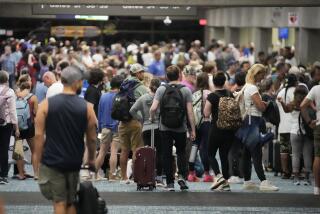Not on Board? Too Bad, That Will Still Cost You
- Share via
I’ve been thinking about this question a lot lately: How can you hand over thousands of dollars for a product, decline to accept delivery of it and have no recourse for recovering your money? The answer: Book a cruise, then cancel it.
“Would you please discuss the exorbitant cancellation penalty of cruise lines?” San Clemente residents Richard and Ena Proctor recently wrote in an e-mail. “Their policy is to keep the entire cost of the cruise, instead of a reasonable amount to cover their reasonable costs.... Most airlines will give you credit for a future flight, and hotels only charge for the first night.... We would understand cruise lines keeping, say, one-quarter or one-third of the total cost, but to keep thousands of dollars is unreasonable, unfair and just plain greedy.”
Here is the Proctors’ story:
On Friday morning, Sept. 21, just before heading out for John Wayne Airport in Orange County to fly to Boston for a New England cruise on Royal Caribbean International, departing the next day, they saw this headline on a TV newscast: “Atty. Gen. Ashcroft says Boston next site of terrorist attack, possibly this weekend.” They called friends in Boston who said they were “terrified” and wouldn’t go downtown, Richard says.
The Proctors phoned American Airlines to cancel their flight. “They were wonderful,” Richard says. The couple got a credit for a future flight.
Then they called the Hyatt Harborside Hotel in Boston, where they had a room reserved. The hotel said, “Don’t worry about it. We won’t charge you for the night,” waiving its 24-hour cancellation penalty, Richard says.
Then, the Proctors say, they called Royal Caribbean. “They said they were sorry,” Richard says. “The grace period was up, and the cancellation fee was the entire cost of the cruise.” (Royal Caribbean, like many lines, waived cancellation penalties for a few days after the Sept. 11 attacks.) The couple was out $2,277 in cruise fares.
The terrorist attack in Boston never materialized. Nor, to date, has the Proctors’ money, despite two letters to Royal Caribbean CEO Richard Fain, they say.
In a Dec. 12 letter to the Proctors denying their request, Fain cited the “hundreds of personnel required for each sailing” plus the expense of food, entertainment and port charges as “costs that are not refundable to us. Consequently, the cancellations [sic] penalties outlined in our brochures have been re-instituted and do apply.”
The Proctors’ story is not unique. Herbert and Marilyn Piken of Studio City also saw news reports of Ashcroft’s warning on Sept. 21.
The next day they were to fly to New York and then go on to Boston for a Holland America cruise departing Sept. 27. (The port was switched from New York after the attacks.)
The Pikens contacted American Airlines, which gave them a refund, and their hotel, Le Parker Meridien New York, which also let them cancel, Herbert says. Then they contacted Holland America. “I thought for sure we’d get at least a credit from the cruise line,” Herbert says. He was wrong. Several calls and letters to the line later, the Pikens say they are still out $12,738.
In cases like the Pikens’, Holland America must enforce its cancellation penalty “to keep consistent,” spokesman Erik Elvejord says. If the line had received an official warning to avoid Boston, there might have been leeway, but “if we were in full operation, there typically wouldn’t have been much wiggle room,” he adds.
The events of Sept. 11 cast a harsh light on cruise lines’ unforgiving cancellation penalties. At some point between 30 days and seven days before departure, most major lines will insist on keeping 100% of your fare.
Cruise lines give various explanations for their policies. Comparing their rules with those of other industries is “like comparing apples and oranges,” says Princess Cruises spokeswoman Denise Seomin. Unlike hotels and airlines, a cruise line risks losing income for a week or more if a trip is canceled.
“If we didn’t have the cancellation windows that we do ... we could find ourselves with a lot of open cabins just before sailing,” says Carnival spokeswoman Jennifer de la Cruz. That’s a problem because unlike airlines or hotels, which she says may be able to profitably operate at 70% to 75% occupancy, ships need 100% occupancy. “The fixed costs of operating a cruise ship are enormous,” she explains.
So what should travelers do to protect themselves?
Buying trip insurance may cover you for last-minute cancellations, but only under certain circumstances. Typically these include a medical emergency, a natural disaster, being called for jury duty, or a hijacking, labor strike or other event that blocks or interrupts travel, says Claudia Fullerton, chief marketing officer for CSA Travel Protection in San Diego. Her company will also cover terrorist incidents within 30 days of your planned arrival--but only in foreign countries. (Some insurers expanded this provision to U.S. soil after Sept. 11.)
Being afraid typically isn’t reason enough for insurers to pay off, nor is losing your job or having to work when you were supposed to be cruising, Fullerton says.
The Pikens, veterans of 22 cruises, hadn’t bought trip insurance; the Proctors had. But it didn’t matter. The Proctors’ policy didn’t cover nonmedical reasons for canceling, Richard says.
Fortunately a growing number of cruise lines have begun selling waiver programs, similar to insurance policies, that will cover you if you cancel for any reason up to either the day of departure or a few days before. They generally offer credit for a future cruise or sometimes refunds for most or all of the fare. Prices range from about $40 to several hundred dollars.
I rankle at paying for a policy that can help cruise lines profit from a situation they have helped cause. From a practical standpoint, however, I agree with Ed Perkins, travel writer and former consumer advocate for the American Society of Travel Agents, who says, “I suspect that for many people, a cancel-for-any-reason policy is a good idea.” He says that “in 30 years of traveling, I’ve never had to cancel for medical reasons, but I’ve had to make last-minute changes for business reasons many times.”
In the last few months, luxury lines Silversea Cruises and Crystal Cruises began offering cancel-for-any-reason programs. Holland America, Norwegian Cruise Line, Princess and Royal Caribbean have similar programs. Carnival, Cunard and Seabourn do not.
Other recourses include contacting your credit card company, which may get a refund for you , or taking the cruise line to small-claims court, Perkins says. He also suggests that “if you think things might be iffy ... wait until two or three weeks before sailing” to book through cruise discounters that sell last-minute cabins. You take a chance of not getting aboard but may lower your chances of losing money.
*
Jane Engle welcomes comments and suggestions but cannot respond individually to letters and calls. Write Travel Insider, Los Angeles Times, 202 W. 1st St., Los Angeles, CA 90012, or e-mail jane.engle@latimes.com.
More to Read
Sign up for The Wild
We’ll help you find the best places to hike, bike and run, as well as the perfect silent spots for meditation and yoga.
You may occasionally receive promotional content from the Los Angeles Times.






